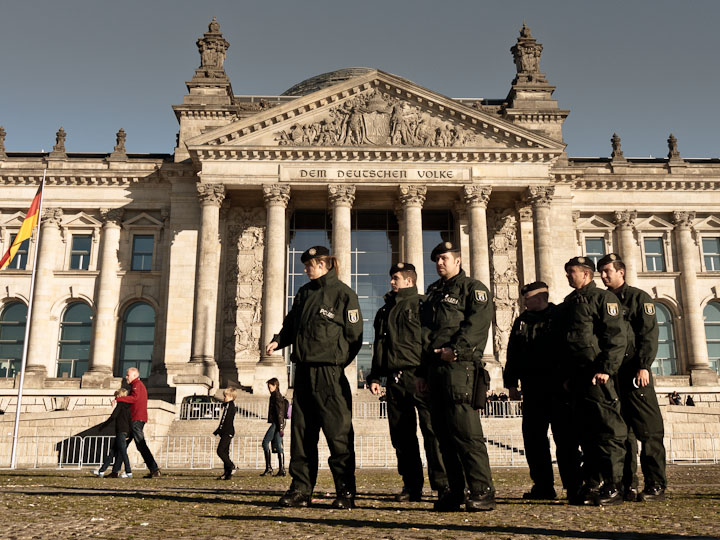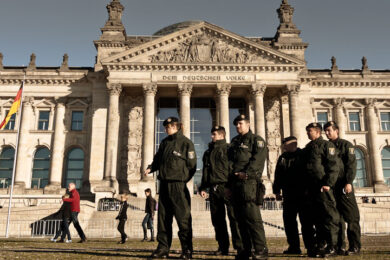It’s Saturday evening, October 15th, 2011, and around the world tens of thousands of people are involved in protests inspired by the #Occupy movement. In the city in which I live – Berlin – several thousand are sat outside the Reichstag, the home of Germany’s parliament, after thousands more marched from Alexanderplatz, along Unter Den Linden, to the Bundeskanzleramt, the country’s chancellery. It’s a remarkable achievement for something that, three months ago, didn’t even have a name. The movement was born of an editorial in Canadian magazine AdBusters at the start of February that called for a popular uprising like those witnessed this year in the Middle East. The name #Occupy came from the Twitter hash tag employed by the magazine, and some five months later it gained the support of Anonymous, the ‘hacktivists’ group. Yet #Occupy remained so low profile that only a thousand or so turned up for the first march on Wall Street in mid September. The subsequent occupation of New York’s Zucotti Park by a couple of hundred people, however, moved others to do the same in other cities, and then in other countries, and with comparable movements growing around the world – the ongoing Arab Spring, for instance, and protests in Greece – October 15th became the focus of activity, inspired by the Spanish Indignants (also known as 15-M) who, back in May, had called for worldwide protests that day.
I, however, am still not terribly familiar with these details, and can be found sitting on my sofa with three German friends, nursing a bottle of Veltins Pilsener and enjoying a slice of Nigella Lawson’s Guinness & Chocolate cake. I baked it myself, and my friends are rather complimentary. Rightly so, I feel. It’s rather good.
I’ve hooked up my Macbook to my big screen TV, and we’ve found a site that offers a live, one-camera stream of events that are taking place in the city centre. It’s a shaky, DIY set up, but it gives us a small sense that we are still part of the demonstration. We were there earlier, you see, but it was so cold once the sun set that, like the fair-weathered protestors we are, the four of us decided to bail. There’s a record on the stereo here, too – A Winged Victory For The Sullen, since you ask – and its mournful ambience lends the pixellated images we are watching a certain gravitas, as though this is footage from some place in the past. I’m reminded of documentaries I have seen about the fall of the Berlin Wall or the Velvet Revolution in Czechoslovakia. In fact, the cinematic nature of the music gives me a feeling that I am watching the climax to a powerful film in which I am emotionally involved but from which I am physically removed. Soon there will surely be a happy resolution and the credits will roll. So, as I sit in my living room, watching these people protest in freezing temperatures for a cause buried deep in their heart, I am strangely thrilled, and grateful too that they are prepared to do what I found a little uncomfortable.
I am so middle class I bleed camomile tea.
We expected an eviction. We’d already watched police storm into the crowd that afternoon, trampling over protestors to remove a tent that had been erected a few metres from the police barriers. I say “erected”, but in fact we were all sitting on a cold, hard surface into which no tent peg could be hammered. Nonetheless, its arrival, after we’d been warned that any form of encampment would be illegal, was provocative, and the police were forced to react. “Let’s go camping,” it said on the side, but before long it had been torn down and carried away. If there had been ginger beer and hard-boiled eggs the police would probably have taken them as well. To be absolutely honest, I felt quietly thrilled then too, especially when other people started passing more tents down from the back of the crowd. I wasn’t actually taking part, but my presence there felt like I was at least lending my support to those who were less afraid of being arrested. In my own, feeble, middle class way, it seemed that I was involved in something dangerous, though I was content to let others actually put themselves at risk.
Was I ashamed when I left the Reichstag that evening, after the four of us had started to shiver? Actually, yes: it was clear that no one would be allowed to stay there overnight, but though I knew it was unlikely that I would set myself up to be dragged from the crowd across the cobblestones to a waiting police van, I still felt like I wanted to offer my solidarity by standing on the sidelines yelling “Shame on you!” and “The whole world is watching!” I’m too much of a coward to offer much more, but just to have witnessed it would have left me feeling like, in even the smallest way, I had been a part of it, and every voice counts.
But no: I’m at home watching others stand up for something I believe in on a flat screen television in the warmth of my bachelor pad with another six pack of Veltins in the fridge. I am as revolutionary as Coldplay.
And yet I care about the #Occupy movement, so much so that I think I’m starting to bore some of my friends. In my nice, middle class fashion, I recognise something’s wrong in the world. With each new revelation in my nice, middle class newspapers, I become a little more like Howard Beale in Network: I know “that things are bad”. I know that “the air is unfit to breathe and our food is unfit to eat”. The #Occupy movement has given me the chance, at last, to get up out of my chair, to go to the window, open it, stick my head out and yell, "I’m as mad as hell, and I’m not going to take this anymore!"
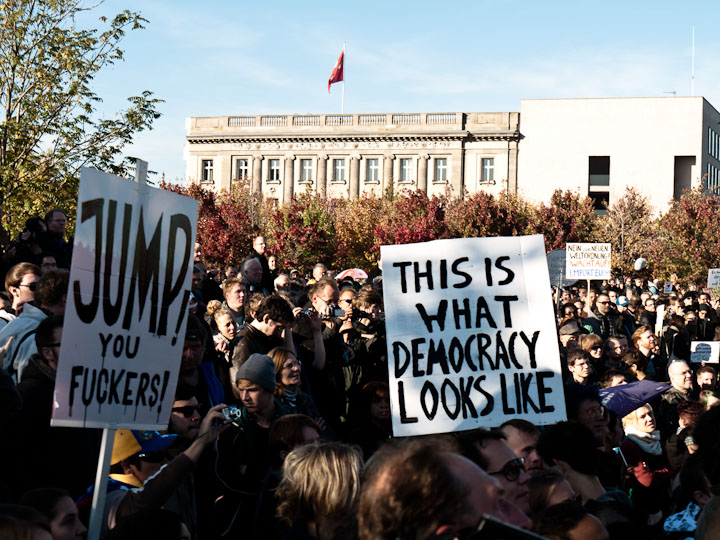
Of course, I might as well take to the streets carrying a banner reading “Down with all of this!” and one of the biggest criticisms made of the #Occupy movement is that their message is at best inarticulate, at worst incoherent. But this isn’t really a single movement: that would suggest a common cause, when in fact each region’s grievances are different. They appeared coincidentally and developed independently, though information and experience has clearly been shared. To link them, in fact, might be as unhelpful in tarring each with the same brush as it is helpful in raising the profile of the overall call for change. Just as each movement sees itself as a leaderless collection of individuals, so any global movement is a leaderless collection of locales, addressing its own issues, making its own rules, according to its own needs, albeit inspired by others pursuing similar goals. If the message doesn’t seem clear enough, it’s merely necessary to stop listening to them all at once and try to find the locale most relevant.
There’s confusion, too, about what the movement’s goals are, and the basic answer is that it seeks to make the world a better place, operated by consensus rather than hierarchy. Sure, that’s a convenient, fluffy response to which some may have trouble subscribing, but is it so bad a goal? Could it be any worse than the state we’re currently in? Friends and family, meanwhile, have asked me what the solutions are in practice, and how I would implement them. But why should anyone expect me to offer solutions? I’m not qualified to tell anyone how to fix what’s happened, and I’m certainly not a spokesperson for something that refuses to have one. I suspect many of the people who consider themselves part of the #Occupy movement don’t have the answers either, but they hope to participate in finding them. Some are there because they feel, for instance, that there’s a huge injustice in the vast divide between rich and poor, or because they abhor the manner in which business has propped up political parties by donating vast sums of money in exchange for the defence of their interests. But others are there because they realise their nice, middle class life is under threat. They weren’t especially bothered when it was just the working classes who suffered, but now that it’s impinging on the quality of their lives they have been forced to acknowledge that there’s a problem. Why this diverse group of people is here is less important than the fact they feel a common cause. They’re no longer prepared to sit idly by. Not all of the time, anyway.
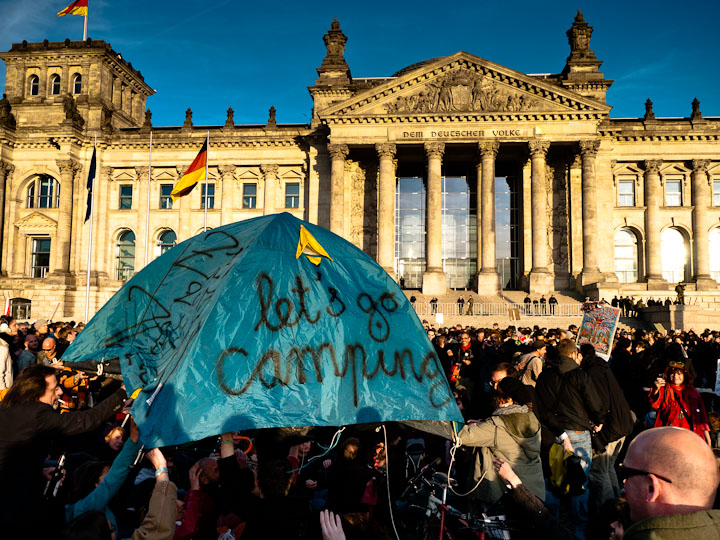
Back in my apartment, as we pop open another beer and put down the plates from which we’ve cleaned every last crumb – not because we were hungry, but because the cake was, if you’ll forgive my arrogance, so damned good – we focus once again on the TV screen. Police are lining up in front of the barriers and cameras are flashing. Not the media’s cameras, naturally. They left after taking pictures of the contingent from Fuck For Forest, a sex-obsessed environmental group. Two women stood, with the Reichstag as their backdrop, dressed in fur coats that hung open to reveal that they were naked beneath, while another man joined them, his penis shrinking noticeably and absurdly in the cold. From what we could see that afternoon, there had only been a few photographers present alongside a handful of reporters with press badges visible to enable a quick escape should things turn nasty, while, occasionally, a TV camera scanned the crowds for someone or something notable. Most of the time they were disappointed by the peaceful, reasonable nature of the protest. Sure, there was a banner which read, “Jump, You Fuckers”, but most signs on display were good-natured, indignant yet calm: “I Can & Will Share”, “We Are Awake”, and, naturally, “We Are The 99%”. It wasn’t the kind of protest the media were looking for, but Fuck For Forest gave them what they wanted, a photo that allowed them to suggest that the #Occupy movement is just another wacky collection of oddballs and extremists. A global protest had, quite frankly, been summed up by a picture of two and a half pairs of tits.
Had the media not departed shortly afterwards, they’d have seen how, their moment in the dying sunshine now passed, the Fuck For Forest campaigners disappeared into the shadows. The protestors continued engaging in discourse about the way forward for their campaign, employing the technique devised by New York protestors, the ‘human microphone’, where a speaker’s words are repeated by the crowd in waves until even those at the back of the crowd have heard them. But though the Fuck For Forest crew could occasionally be heard shouting, “Tanzen, tanzen” (“Dance, dance”), the human microphone was by now pointed in a very different direction. No one tried to remove them, of course: if the movement is to identify itself as “the 99%” – named after a 2007 statistic showing that 1% of the American population own almost 40% of the country’s wealth – then removing anyone reduces the integrity of that classification. Their role was simply restricted to showing their privates, without invitation, something that’s hardly shocking to a nation where everyone and their granny has flashed their bits on a beach. For most people beyond the Reichstag, however, they would still embody the protest. Polite members of the middle class don’t make for great TV.
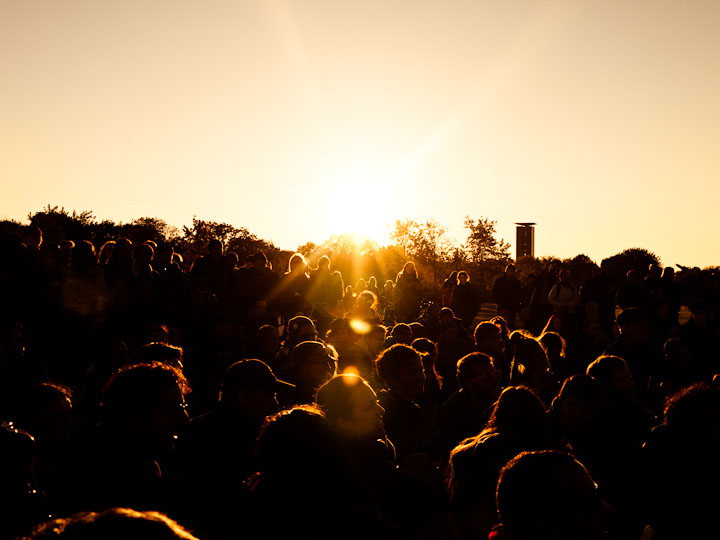
Watching polite members of the middle class rediscovering the concept of democracy in a pure form makes for a surprisingly touching spectacle, though. The use of the human microphone is time-consuming, obviously: if you’re going to allow everyone to speak out, and if you’re going to allow the message to get passed on, then it’s inevitably going to take a while. So there are a few basic rules, swiftly explained: to emphasise how everyone is here as an individual, no party or issue affiliated speeches are allowed, and a universal set of signals will be employed to express responses most effectively, with jazz hands denoting approval, crossed wrists in the air signifying a veto, and a rolling of the hands for impatience.
Initially it’s touch and go as to whether any of the protestors’ patience can endure: the ‘microphone’ appears at points to be faulty, with some people failing to pause to allow for their words to be repeated, and many of the crowd content simply to observe. Some people are therefore unable to hear what is being said, while others seem disinterested and simply hang out in the sun, talking amongst themselves. It’s taken a while for people to find their voice, so it will no doubt take a while for them to find their feet within its routines. But people slowly familiarise themselves with the procedure, and the realisation that anyone is allowed to speak out if they want to, that everyone has a right to be heard as long as they adhere to the key principles, is empowering for all present.
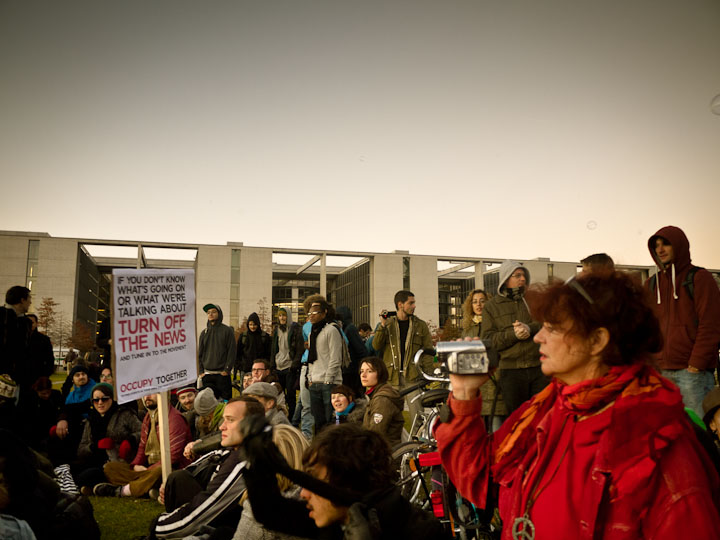
Many people recognise that such an approach will be impractical in the long term, but they want to prove that fundamentally it can work, that democracy involves debate and discussion and that its decisions should represent the overall consensus. By the time I returned to the Reichstag on Wednesday, protestors were fine-tuning their systems, wary of the fact that a good half hour had already been lost trying to establish for new arrivals exactly what each hand signal signified. Work groups were also in place, designed to streamline detailed decision-making, with each cell then reporting back to the overall assembly. They’ll need to move fast if they want to keep people’s attention, but they need, even more importantly, to make sure their methods are sound.
Such is not the stuff of soundbites, however, so the only cameras flashing in front of the Reichstag tonight belong to the people, and immediately the four of us know something’s up. Part of the manner in which the #Occupy movement has spread is by the sharing of videos recorded during protests, evidence of the aggressive nature with which authorities are attempting to repress their voice. Each new clip showing non-violent protestors pepper-sprayed, or kettled, or arrested, even for attempting to close their bank accounts, wins sympathy for a cause that the mainstream media has, until recently, portrayed in a manner designed to belittle it, just as the German media this Saturday afternoon has done. They beg the question why, if the protestors’ message is so incoherent, and their cause so easily dismissed, do the police feel the need to react so belligerently? What is going on that makes them so afraid? And so people record events on their phones, hoping to embarrass the authorities by highlighting the disproportionate force being used to maintain the status quo. The authorities have their symbols: their uniforms, their slick suits, their smart cars, their skyscrapers. But the people have tents, and even these are torn from their hands.
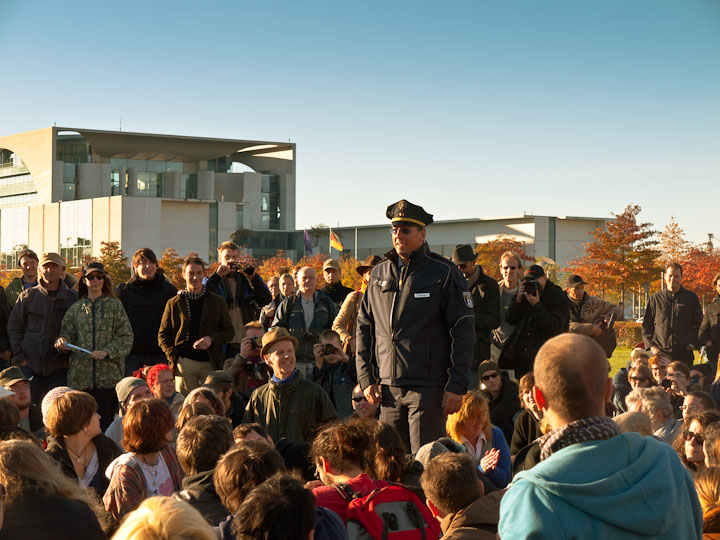
We turn up the volume to hear police issue the first of three warnings to vacate the Platz Der Republik. We stop talking, the screen briefly showing the Reichstag and the inscription engraved into the edifice above its grand steps, “Den Deutschen Volke” (“For The German People”). This is where the police are telling them they are no longer allowed to stay. There’s a second warning a few minutes later, and the tension grows, both on the ground and in my living room. The cameraman and his companion can be heard, one of them saying something like, “I don’t want to get caught up in the middle of this shit." We know what’s about to happen, and the shame we feel at no longer being there is rising as fast as temperatures dropped earlier in the afternoon. Then the third warning comes, lines of policemen move towards the crowd, and suddenly we gasp, not at what we see, but at what we don’t see. The picture disappears.
Over 7,000 people were streaming the video when it went down, meaning that at least 10,000 could have been watching, and once again they’ve been prevented from learning the truth. We wait for it to return, refreshing the screen repeatedly, and then we wait, and we wait, and we wait some more. We check other websites too, but there’s no news anywhere. The only source of information we have now is the chat room alongside the dead stream. It’s rapidly filling with questions and rumours – “30 people run over by police vehicle?”, “Did they arrest the cameraman?” – and moves too fast to follow closely, propelled further by spammers offering links to Trojan-spreading websites and extremists blaming Jews for our current financial woes. The picture finally returns after my guests have gone home, revealing an empty Platz Der Republik, rubbish and personal belongings strewn across the frosty ground where only half an hour ago people like us sat peacefully discussing the fairer future they all wanted to share. It looks unmistakably like a battlefield.
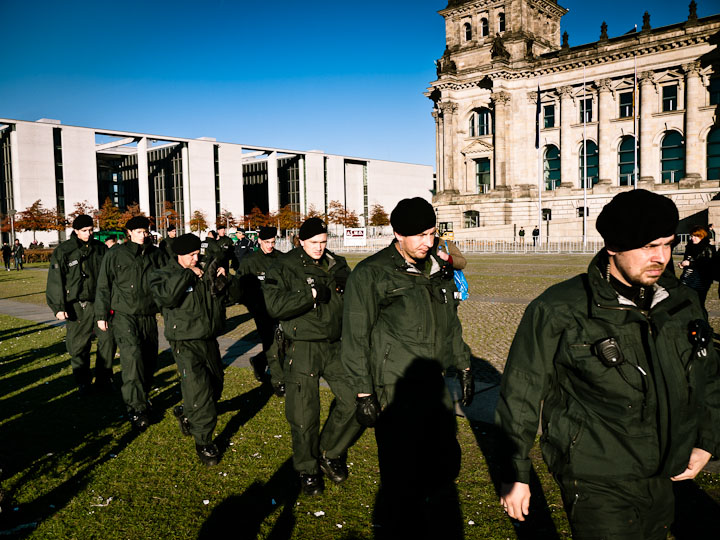
Reports the next day, illustrated by photos of people waving witty banners, wearing V For Vendetta masks, or not wearing anything at all, barely touch upon how the evening ended. A few mention that police cleared the area, and that eleven of them were injured. How they were hurt is not explained, and no mention is made of the civilian casualties. But I’ve read reports that there’s an encampment outside St Paul’s Cathedral in London, and that around 1,500 demonstrations took place in 82 countries across the world. For a message that is supposedly vague, there’s a lot of people joining it. There is absolutely no way that I’m spending my whole Sunday on the sofa, I decide, and pack a bag with gloves, a hat, a scarf, a thermos of tea and some chocolate, pull on my winter coat and take the U-Bahn back to the Reichstag.
When I arrive, I wonder whether the effort’s been in vain: there are less than thirty people assembled, outnumbered by tourists in their hundreds. But soon the numbers grow and stories are exchanged: amongst them, it’s alleged that the phone networks were shut down as police moved in the previous evening, cutting off the live stream and preventing protestors from communicating with each other, let alone the outside world. Police are here again, naturally – far more punctually than the protestors, in fact – and they inform us that not only does an encampment remain illegal, but also that any items associated with camping will be confiscated. They’re friendly, but they’re firm, and, though they back away, their presence is always felt, hovering on the outskirts of the area, a constant distraction as people monitor their activities.
Another debate begins, as drawn out as Saturday’s, this time about when the best time to meet will be over the coming days: people have to work in the mornings, but the evenings here are too cold, so perhaps 4pm would be good, or maybe 5pm? Police return however, drawn to a woman who has lain down on a camping mat. This, they remind her, is prohibited. To begin with, no one really believes they’re serious. They’re laying down the law, but it’s a camping mat, for heaven’s sake. Yet, as she quietly argues that she has a right to lie down in comfort, a second phalanx of police march towards her until she is surrounded and an exit route has been established. Realising that this is graver than anyone initially recognised, the human microphone kicks into action once again, with both her words and the police’s repeated so everyone can hear them. Finally she yells out, determinedly, “Ich will die Isomatte behalten” (“I want to keep the camping mat”).
It’s a dramatic moment, absurd and horrible at the same time, because the police reach out, grab her under the armpits and drag her away. “Shame on you!” the crowd screams, and then, “You are one of us!”, and in all honesty one or two of the police look far from happy at the action they’ve been forced to carry out. The protestors remain nonviolent, however: the moral victory is theirs. This weekend has been all about symbols, and they’ve just been gifted another.
A suggestion is made during the ensuing discussion that protestors should demand to speak to the head of police, and this is relayed to the authorities. Perhaps indicative of the fact that, though there are less demonstrators than the police had prepared for, there are now several hundred of us, certainly more than they hoped would turn up and something they need to take seriously, a short time later an officer in sunglasses and a far smarter uniform arrives. He is Police Chief Manske, and he’s admitted into the centre of the circle, where he asks if he can speak with the leader of the assembly. He appears intelligent enough to realise that he is now engaged in another symbolic act, and, treating the protestors as respectfully as they have treated him, he allows his words to be repeated by the human microphone. There is, he is told, no leader. This is a collection of individuals. An assembly must have a leader, he explains, but he is advised that this isn’t an assembly at all, merely a group of individuals who have all coincidentally congregated on this beautiful autumn afternoon. “Will you be our leader?” a protestor asks flippantly. “I’m already head of police,” he grins back. Police Chief Manske and the protestors – or at least some of them – decide they like each other. For the moment, anyway.
Whether the protestors will succeed in changing things depends upon how perception of their movement develops. Some have sought to identify it as anti-capitalist, a movement centred upon a potentially destructive and extremist ideology, but they represent only a small part at most, and the media seems slowly coming round to that fact. There have been suggestions, too, that the middle classes don’t have the stamina to see it through, and from my own experience this is a possibility: some people remain unconvinced that they can make any difference, and others are too busy to get involved or simply too apathetic to care. There are claims, as well, that it hasn’t reached the working class, but that’s based on a generalisation, and doesn’t take into account other expressions of dissatisfaction, most notably the recent riots in England. Furthermore, there are a fair few examples of the middle classes leading a revolt: the French Revolution, and the American Revolution, and the Russian Revolution, and, more recently, the Arab Spring movement.
So whether these movements will gain traction remains to be seen, but the signs are that they can: the sheer speed with which the protests have blossomed, powerful campaigning by the likes of MoveOn.org and its local equivalents, the use of social networking sites to disseminate footage useful to their cause, and the growing acknowledgement by the media that, as their audience starts to look increasingly favourably upon what’s happening, they need to alter their tone. Politicians, too, have expressed their support for the movement, though given that many of them are the cause of their problem, and would attach themselves to a guillotine if a study showed it could win votes, that may not prove terribly influential. But there are increasing calls within the so-called 1% for change, a sign that the pursuit of wealth for wealth’s sake may be losing its appeal: websites from across the spectrum echo recent comments made by Warren Buffett that the mega-rich, like himself, enjoy “extraordinary tax breaks”. The wind of change, as they once called it, may be picking up.
Back in the sunshine, Police Chief Manske spends seven minutes chatting, but it’s perhaps the first time that anyone in authority present has dealt with the protestors as equals during the weekend. It’s perhaps for show, but frankly all of this is. And it’s effective. After he’s left, there is no further confrontation. When evening falls, apart from a few who have to vowed to camp out in ground nearby that has been declared legally available to them, some of them having travelled long distances, people slowly migrate home. Their voices have at last been heard, if only briefly, if only figuratively. It’s a polite, middle class ending to a polite, middle class protest. Some of the protestors will return, from the militant to the curious. Others will join them, a few staying overnight in the campsite that’s being established. More, too, will watch events unfold on television, or in the newspapers, or on websites, and they’ll start to realise that the reason the message is inarticulate and incoherent is precisely because they are the 99%, and 99% of the people don’t agree on much. But they agree on certain things, and those are the reason they are united.
That’s my opinion, anyway, and it’s as valuable as yours. Now it’s about the consensus…

